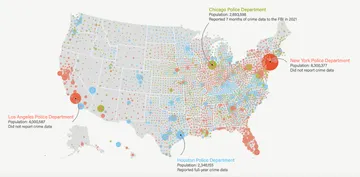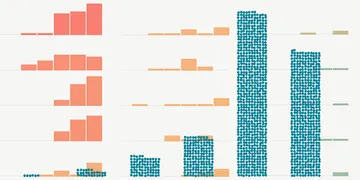The Trump Administration says it is trying to secure the southern border of the United States from what it describes as a flood of criminals. But in fact its immigration policies are affecting a wide variety of people—more than 1.1 million—many of whom live far from the Rio Grande. Here are some of the programs the administration is trying to change, their current status, and, where known, the number of people whose lives hang in the balance:
DACA
Close to 800,000 immigrants living in the United States are anxiously watching lawsuits that are trying to preserve the program that has allowed them to remain in the country legally. Under the Deferred Action for Childhood Arrivals program, or DACA, people whose families brought them to the United States as children without legal status received renewable two-year permits to forestall deportation.
In 2017, the Trump administration announced it wanted to end the program. The U.S. Supreme Court is now considering a petition from the White House to hear three cases challenging that policy.
Temporary Protected Status
The Trump administration has also announced plans to end large parts of a program affecting 325,000 immigrants from countries deemed too dangerous to return to because of natural disasters or war. The administration wants to eliminate protections for people from El Salvador, Haiti, Nicaragua and Sudan, who together account for the majority of the immigrants covered by the program. A federal court judge in the Northern District of California recently blocked that move at least until April.
The Department of Homeland Security has announced the protections for close to 9,000 people from Nepal will end this summer and for 57,000 immigrants from Honduras in 2020.
Asylum seekers
Nobody knows exactly how many immigrants are seeking asylum in the United States right now. One indication the figure has been rising: apprehensions along the border of people travelling with families jumped 42 percent to more than 105,000 in the last fiscal year.
Overall, the number of court decisions on asylum claims rose in the last fiscal year by more than 10,000, to 42,224. About 65 percent of claims were denied, according by the Transactional Records Access Clearinghouse, compared to 60 percent the year before.
The administration has started forcing asylum seekers to wait on the Mexican side of the border, despite a federal court order blocking its new policies.
Under the administration’s “zero tolerance” policy, anyone caught along the border was immediately “subject to criminal prosecution for illegal entry.” Parents were held in federal pretrial detention while their children were reclassified as unaccompanied minors. The policy led to the separation of more than 2,342 children from their families over the course of two months. After a public outcry, the Trump administration reversed itself in June.
A week later, U.S. District Judge Dana Sabraw in Southern California ordered that families had to be reunited within 30 days. Despite the judge’s order, ProPublica reported in November that the ACLU found 17 families were still separated. The Department of Justice claimed that in 14 of the cases, the parent had a criminal record, which many of the families dispute.
Undocumented crime victims
Undocumented crime victims who cooperate with police investigations can qualify for a special visa under a 2009 program that limits these so-called U visas to 10,000 a year. More than 200,000 applications are pending.
Under previous administrations, victims whose applications were turned down were not liable to be deported. But that has changed under a U.S. Citizen and Immigration Services policy adopted in November. Now, people whose U visa applications are denied are called to appear before an immigration judge and could be subject to deportation. The number of people affected is unknown. The new rule also applies to special visas granted to victims of human trafficking.
Refugees
For refugees—people outside the U.S. who are seeking asylum and resettlement here—the Trump administration has set an admissions cap of 30,000 for this fiscal year, one-third fewer people than were admitted last year.
The drop in refugees has led to funding struggles for resettlement agencies, even though the number of applications for refugee status rose by nearly one-quarter to more than 141,000 in fiscal 2017. Meanwhile, admissions have fallen; in 2017, the U.S. approved about 53,500 applications, a 36 percent drop from the year before.

